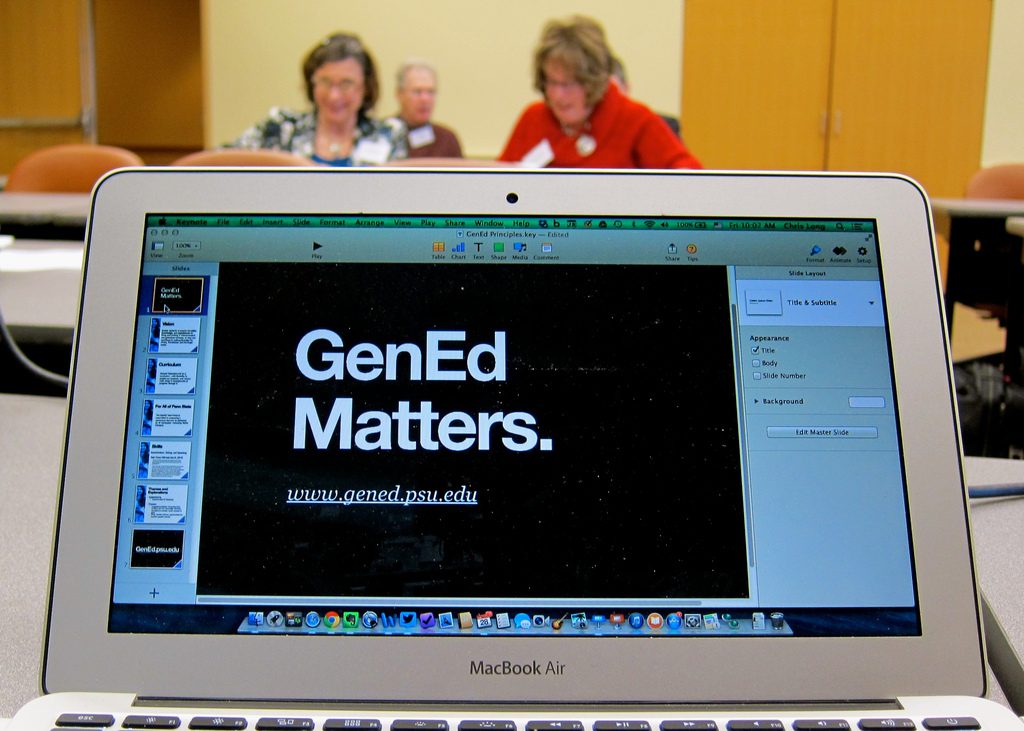We at Penn State are engaged in an intense, ongoing and, in my view, very healthy dialogue about General Education reform.
In the course of our conversations with faculty here at University Park, I often hear talk of a tension between the teaching and research missions of the University.
In one version or another, the suggestion is made that if we are going to take General Education seriously by asking our research faculty to participate in substantive and sustained ways, it will come at the cost of our strengths in research, strengths that have led to our recent successes in national and international rankings.
This concern is symptomatic of a culture in which the connection between teaching and research has eroded. Mitigating this erosion is reason enough for a serious engagement with the question of General Education.
If we look, however, at the first sentence of Penn State’s mission statement, we find teaching, research, and service tightly connected:
Penn State is a multicampus public research university that educates students from Pennsylvania, the nation and the world, and improves the well being and health of individuals and communities through integrated programs of teaching, research, and service.
The general education curriculum ought to be a site for the integration of teaching, research, and service.
The General Education Task Force has already affirmed that engaged scholarship should be available to students within the GenEd curriculum. My support for putting themes (coordinated clusters of courses concentrating on a focal concept) at the center of the curriculum is animated in no small part by a desire to integrate the research endeavor into the heart of the undergraduate experience.
A challenge we face is how to accomplish this within an institutional culture and structure that often divorces the research it privileges from the teaching it champions.
One possible way to address this was recently suggested to me after a lively and thoughtful town hall meeting on GenEd with the faculty in the College of the Liberal Arts.
Leveraging Centers in Cultivating Themes
Lee Ann Banaszak, incoming Head of the Political Science Department, suggested that we look to our institutes and centers as “a source of innovation and movement on developing themes.” In a follow up email, I asked her to flesh the idea out further. She wrote:
The research institutes already provide a venue for faculty with links to overarching themes to work together on collaborative research ideas. For that reason, initial discussions within and between institutes could provide the interdisciplinary connections that faculty need to develop themes.
Lee Ann is right.
The university has already cultivated a robust infrastructure of collaborative, interdisciplinary research. Our major university institutes and our wide diversity of centers located in colleges are designed to work across disciplinary boundaries to develop innovative research programs. They often have significant financial resources to pursue specific initiatives associated with graduate and undergraduate curriculum.
We ought to more intentionally engage leaders of these interdisciplinary research initiatives in the GenEd reform process. More specifically, we ought to draw on their passion, skill, and expertise in developing a core set of themes in which undergraduate research has a central place. Putting the University’s research interests into concrete pedagogical practice could, in turn, enrich the research undertaken by center and institute faculty.
Such a symbiotic relationship between research and teaching would enhance the educational experience of research faculty and undergraduate students alike; it would further the University’s mission of integrating research, teaching, and service; and it would weave the research endeavor more tightly into the Penn State undergraduate experience.

